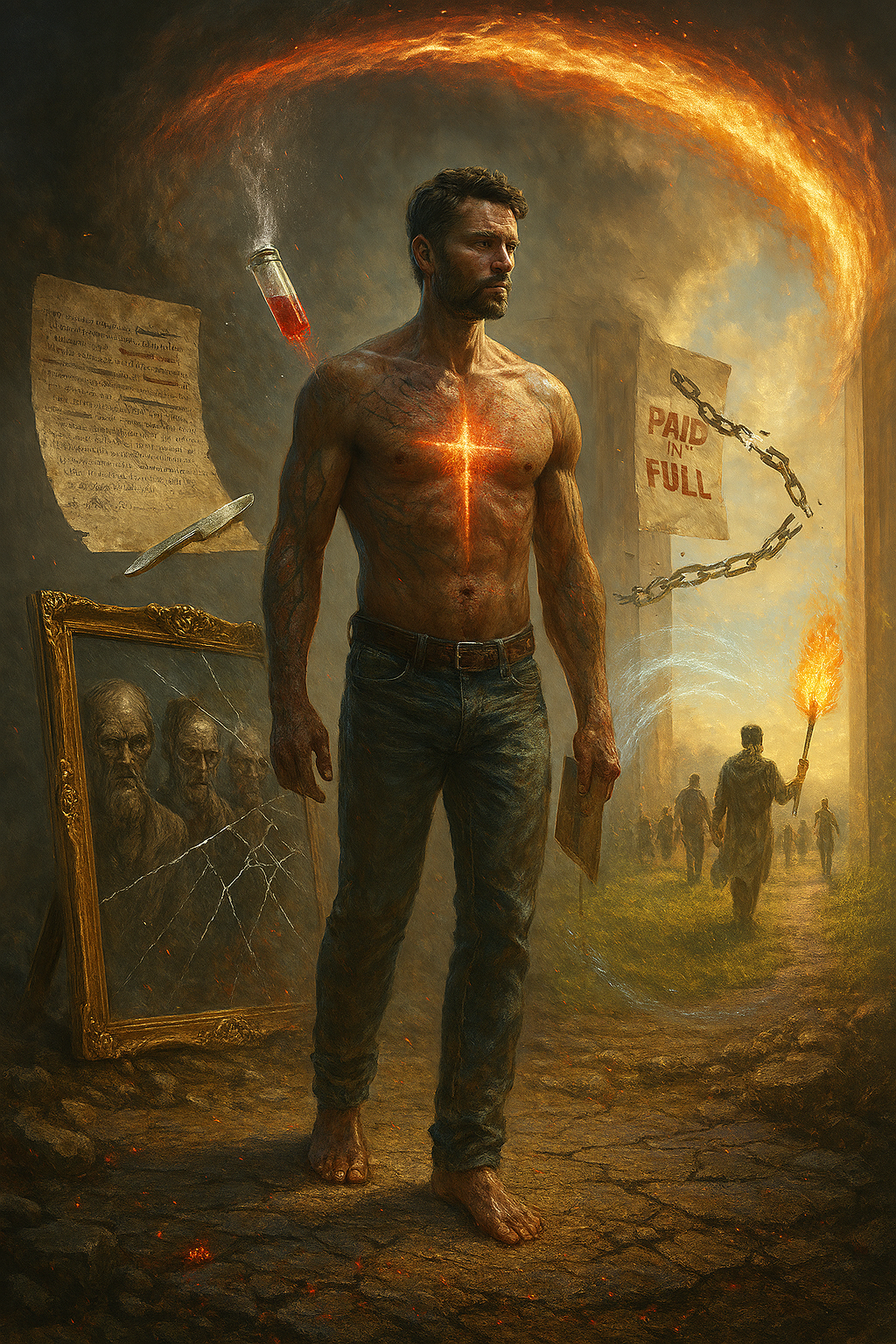Physical Address
304 North Cardinal St.
Dorchester Center, MA 02124
Physical Address
304 North Cardinal St.
Dorchester Center, MA 02124
With Michael Walker
With Michael Walker

A message to the Believer.

There is a difference between being cured and being trained. One removes the infection. The other teaches the healed how to walk. The gospel does not end with the transfusion—it continues into the transformation. Once the blood is replaced and the nature reborn, the believer must learn to live from the new life. This is not behavior modification—it is identity revelation. The practice of holiness is not performance—it is the outflow of regeneration. And unless this practice is understood, the believer will live as if still infected, still condemned, still under review. This deep dive explores the embodiment of the cure: living as healed, releasing others, and building boundaries.
Second Corinthians 5:17 declares, “Therefore if anyone is in Yehoshua, this person is a new creation; the old things passed away; behold, new things have come.” This is not poetic encouragement—it is ontological transformation. The believer is not a cleaned-up sinner. He is a new species. The blood has changed. The nature has shifted. The genome has been rewritten. First John 3:9 confirms, “No one who has been born of God practices sin, because His seed remains in him; and he cannot sin continually, because he has been born of God.” This is not behavioral perfection—it is genetic immunity. The seed of God abides. The infection is eradicated. The compulsion is broken.
Romans 6:4 adds, “Therefore we have been buried with Him through baptism into death, so that, just as Yehoshua was raised from the dead through the glory of the Father, so we too may walk in newness of life.” The walk is not a performance—it is a practice. It is the embodiment of the cure. It is the daily outflow of the transfusion. It is the spiritual equivalent of a healed patient learning to breathe again, move again, live again.
But the practice of holiness is not solitary. It is communal. Colossians 3:13 instructs, “Bearing with one another, and forgiving each other, whoever has a complaint against anyone; just as the Lord forgave you, so you do too.” The word used here is χαρίζομαι (charizomai), meaning to graciously release, to cancel a claim, to drop the debt. It is not re-atonement. It is not emotional appeasement. It is the human echo of a divine reality: the claim has been dropped. The debt is canceled. The case is closed.
Ephesians 4:32 echoes the call: “Be kind to one another, compassionate, forgiving each other, just as God in Yehoshua also has forgiven you.” Again, charizomai. The release is not earned—it is gifted. The claim is not negotiated—it is canceled. The forgiveness is not emotional—it is covenantal. You are not being asked to feel better—you are being asked to release what heaven has already resolved.
This release is not optional—it is essential. Matthew 6:14–15 warns, “For if you forgive other people for their offenses, your heavenly Father will also forgive you. But if you do not forgive other people, then your Father will not forgive your offenses.” This is not transactional threat—it is relational coherence. You cannot receive release and refuse to echo it. You cannot be cured and continue to prosecute. You cannot be healed and continue to hold others hostage.
But release does not mean recklessness. Boundaries are essential. Galatians 6:1 instructs, “Brothers and sisters, even if a person is caught in any wrongdoing, you who are spiritual are to restore such a person in a spirit of gentleness; each one looking to yourself, so that you are not tempted as well.” Restoration is the goal—but protection is the method. Boundaries are not punishment—they are wisdom. They preserve the integrity of the cure. They prevent reinfection. They honor the healing.
Romans 12:18 adds, “If possible, so far as it depends on you, be at peace with all people.” Peace is not passivity—it is intentionality. It is the pursuit of relational health without compromising spiritual immunity. It is the practice of grace without the abandonment of discernment.
Restitution also plays a role. Luke 19:8 records Zacchaeus saying, “Behold, Lord, half of my possessions I am giving to the poor, and if I have extorted anyone of anything, I am giving back four times as much.” Restitution is not re-earning grace—it is repairing damage. It is the fruit of healing, not the price of forgiveness. Matthew 5:23–24 instructs, “If you are presenting your offering at the altar, and there you remember that your brother has something against you, leave your offering there… and go; first be reconciled to your brother.” Reconciliation is not optional—it is essential. It is the horizontal echo of vertical release.
Confession, too, must be reframed. First John 1:9 says, “If we confess our sins, He is faithful and righteous, so that He will forgive us our sins and cleanse us from all unrighteousness.” Confession is not a plea for re-forgiveness. It is the alignment of conscience to a verdict already rendered. It restores fellowship, not justification. It clears the fog, not the record. It is the spiritual equivalent of waking up in a clean room and realizing the surgery is complete.
Discipline must also be understood. Hebrews 12:6 declares, “For the Lord disciplines the one He loves, and He punishes every son whom He accepts.” Discipline is not condemnation—it is training. It is not prosecution—it is preparation. It is not wrath—it is refinement. The believer is not being punished—he is being equipped.
To understand this, consider the physician’s oath. You’ve received the cure—now carry it to others. Or the firewall maintenance. Boundaries are spiritual hygiene. Or the surgical discharge. You’ve been healed—now live as one who is whole. Or the two clocks. Heaven’s clock says “clean.” Earth’s clock catches up as your conscience awakens. Or the immune system. Once the transfusion is complete, the body must learn to fight off reinfection. Or the rehabilitation center. The surgery is done—but the training has just begun.
This is the pastoral call. Teach identity first. You are healed. You are new. You are not on trial. Model release. Drop claims. Refuse condemnation. Practice gracious boundaries. Equip for restitution. Help believers repair harm without shame. Train in discipline. Frame correction as growth, not guilt.
The believer must live as one who is healed, but also as one who guards the cure. The practice is not optional—it is essential. The training is not punishment—it is preparation. The boundaries are not rejection—they are protection. The release is not weakness—it is strength. And the life that flows from the transfusion must be stewarded, guarded, and shared. The cure has been administered. The fire stands ready. Live as one who has been healed—and carry the cure to those who still wait in silence.